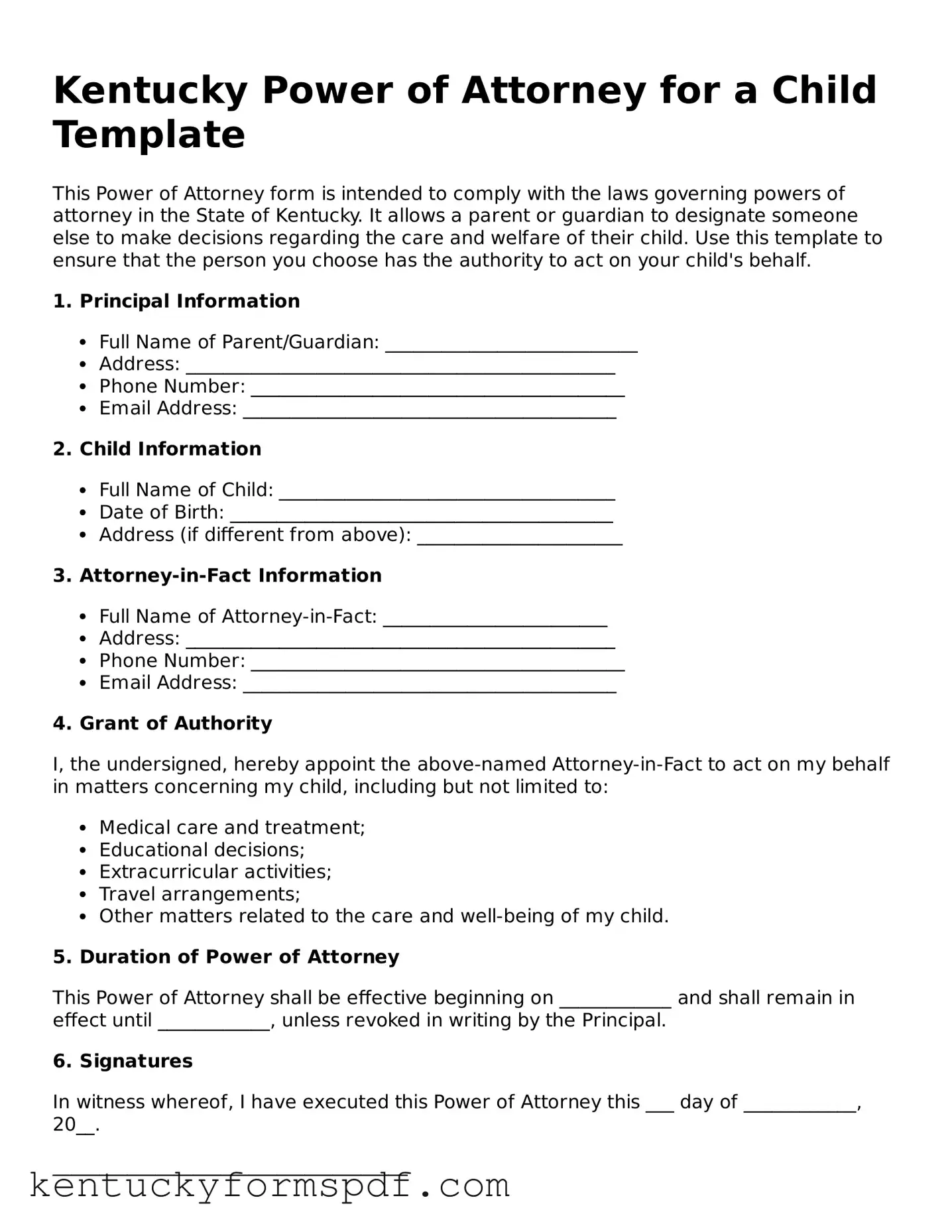What is a Power of Attorney for a Child in Kentucky?
A Power of Attorney for a Child in Kentucky is a legal document that allows a parent or legal guardian to grant another individual the authority to make decisions on behalf of their child. This can include medical decisions, educational choices, and other important matters. It is especially useful when parents are unavailable due to travel, work commitments, or other circumstances.
Who can be designated as an agent in a Power of Attorney for a Child?
In Kentucky, a parent or legal guardian can designate anyone they trust as an agent in a Power of Attorney for a Child. This could be a relative, friend, or trusted neighbor. It is essential to choose someone who understands the responsibilities involved and is willing to act in the child's best interests.
Is a Power of Attorney for a Child required to be notarized?
Yes, in Kentucky, the Power of Attorney for a Child must be notarized to be legally binding. This means that the document must be signed in the presence of a notary public, who will then verify the identities of the signers and affix their official seal. This step helps to prevent fraud and ensures that the document is recognized by authorities.
How long does a Power of Attorney for a Child remain in effect?
The Power of Attorney for a Child can remain in effect for a specified period, as determined by the parent or guardian when drafting the document. Alternatively, it can be set to last until a certain event occurs, such as the child reaching a specific age or the parent returning from a trip. It is crucial to clearly outline these details in the document.
Can a Power of Attorney for a Child be revoked?
Yes, a Power of Attorney for a Child can be revoked at any time by the parent or legal guardian. To do this, the revocation should be documented in writing and signed by the individual who granted the original Power of Attorney. It is advisable to inform the designated agent and any relevant parties about the revocation to avoid confusion.
What decisions can an agent make under a Power of Attorney for a Child?
An agent designated under a Power of Attorney for a Child can make various decisions, including but not limited to medical care, educational decisions, and general welfare matters. However, the specific powers granted can be tailored to the parent’s or guardian’s preferences, allowing for flexibility in the authority given.
Are there any limitations to the authority granted in a Power of Attorney for a Child?
Yes, there can be limitations placed on the authority granted to the agent. For example, the parent or guardian may specify that the agent cannot make certain medical decisions or must consult them before making significant choices. Clearly outlining these limitations in the document is essential to ensure that the agent understands their boundaries.
Do I need an attorney to create a Power of Attorney for a Child?
While it is not legally required to have an attorney draft a Power of Attorney for a Child, consulting one is highly recommended. An attorney can provide guidance on the specific needs of the family, ensure that the document complies with Kentucky laws, and help avoid potential pitfalls that could arise from poorly drafted documents.
What happens if the Power of Attorney for a Child is not used?
If the Power of Attorney for a Child is not used, it simply remains in effect until it is revoked or until the specified expiration date. It does not create any obligations or responsibilities for the designated agent unless they choose to act on behalf of the child. However, keeping a copy of the document accessible is advisable in case the need arises.
Where can I obtain a Power of Attorney for a Child form in Kentucky?
Power of Attorney for a Child forms can often be obtained from various sources, including legal websites, local government offices, or family law attorneys. It is important to ensure that the form used complies with Kentucky law and includes all necessary elements to be considered valid.

